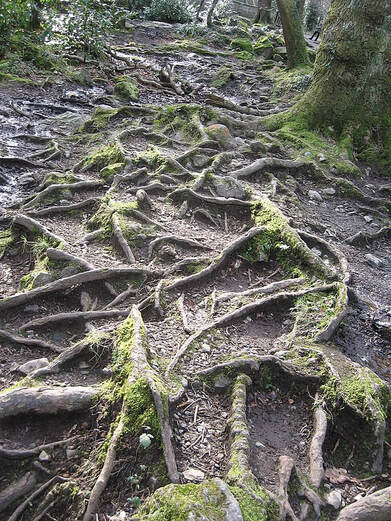
This morning want to chew over important words from Esteva & Prakash’s discussion of comida/eating. My educational philosophy teacher, Madhu’s class utilized their book Escaping Education rather than Grassroots Postmodernism, but I have a read much of that book as well. Here I’m going to transform their words comida/eating and “culture” into “music/musics/musicking/musickers” to draw our attention to the depth of Esteva & Prakash’s challenge to my field, music education. Other than that, this is a direct quote:
"Our journey starts with the culture of [music]. [Music] belongs to an ethnos, but it can never be reduced to ethnic [musicking]. By crossing over the chasm that separates the first from the second, peoples are transmogrified into modern industrial [musickers]. [Music] disappears where people buy, prepare and cook [music] to nourish the myth of the “individual self.” Regenerating ourselves means, among other things, escaping the prison of industrial [musicking] and ethnic [musics]." (Esteva & Prakash 1998, 55)
This sentence, “By crossing over the chasm that separates the first from the second, peoples are transmogrified into modern industrial [musickers],” has been central to my published work, and is also to be found in Madhu’s mentor (my scholarly grandpa), Ivan Illich’s work. This quote, from Ivan Illich’s (1990) Declaration on Soil:
"We were torn from the bonds to soil - the connections that limited action, making practical virtue possible - when modernization insulated us from plain dirt, from toil, flesh, soil and grave. The economy into which we have been absorbed - some, willy-nilly, some at great cost - transforms people into interchangeable morsels of population, ruled by the laws of scarcity." (http://www.davidtinapple.com/illich/1990_declaraion_soil.PDF)
And so, here I stand, torn from my bonds of soil by an industrial system that has done just that to countless folk for centuries. When I walk in Patton, I see a shell of its former self. A town that has suffered the loss of its children for many generations, that has water and soil poisoned by long-gone industry, and, for the people who stayed, lack of job opportunity and a plethora of addictive drugs. This is the town where I was raised, where my brothers and sisters, my mom, and her dad were raised; and within six miles of where my mother’s mother, my father, and his parents were raised, and where many of my ancestors are buried—going back to the 19th Century when Eastern European people’s soil was transmogrified into Private Property, and the peoples of the soil, often called peasants, were torn from the soil. From communal property. As Marx wrote as early as 1867 of peoples elsewhere in Europe, “landlords grant[ed] themselves the peoples lands as private property” (https://www.marxists.org/archive/marx/works/1867-c1/ch27.htm).
I look at my garden, where to cultivate the land means, in common gardening praxis, to take a tiller to the living ecosystem beneath the soil. To tear years-dead roots from the grasp of living roots. To gain temporary productivity through destruction, as this plot of soil is transmogrified into production for the sake of produce. But tilling is unnecessary as permaculture gardeners and farms have known for decades. Every old-growth forest has loose soil. The same is true for music education, which is why we must, to reuse of Prakash & Esteva (2008), escape education.
I escape the tiller, just as I must escape music education. Music education tears children from the bonds of intergenerational community just as effectively as the tiller tears roots. Children begin to produce, but at what cost? Decimated rural towns and villages around the globe for the sake of urbanization (this story is repeated in the Global South, and in China, just as it is repeated in the U.S.); to draw all of the intellectuals to one place, all of the engineers to another, all of the businesspeople to a third, all of the carpenters to fourth, all of the farmers to a fifth, never to meet again? Hidden behind the walls of industrial suburban “communities”? Behind the walls separating fictitious nations on Turtle Island; walls that also destroy the lives of migrating non-human animals who know nothing of nations? Onto the superhighway of what goes for success in 21st Century capitalism, while most people find only suffering, unable to win that lottery?
Even the ivory-white tower of universities, maybe especially so, this is so. Most faculty are “part-time” adjuncts, teaching most of the coursework and seldom receiving either the middle-class salaries that capitalism falsely promises nor basic healthcare or retirement programs. Just as farmers can’t quite tell you why soil is always compacted when it’s tilled over and over, since tilling is meant to loosen the soil, music teachers can’t seem to tell you why so many people are self-identified non-musicians after they have been cultivated by the music curriculum (see https://deepgreenpermaculture.com/diy-instructions/no-dig-gardening/). Some farmers think more tilling will loosen the soil, and some music teachers think more music education will fix the problem of non-musicians. It may be that the only way to re-member (again, Esteva & Prakash 1998) music, to put our musicking bodies back together, is to escape music education. To return to grassroots, intergenerational, emplaced musicking. But this requires also re-membering quite a bit more than just musics. We must re-member one another, community, intergenerational and living.
DS
References
Esteva, Gustavo and Madhu Suri Prakash. 1998. Grassroots post-modernism: Remaking the soil of cultures. New York: Zed Books.
Prakash, Madhu Suri and Gustavo Esteva. 2008. Escaping education: Living as learning within grassroots cultures. New York: Peter Lang.
Link to image: https://upload.wikimedia.org/wikipedia/commons/thumb/5/5e/Tree_Roots.JPG/640px-Tree_Roots.JPG
 RSS Feed
RSS Feed
